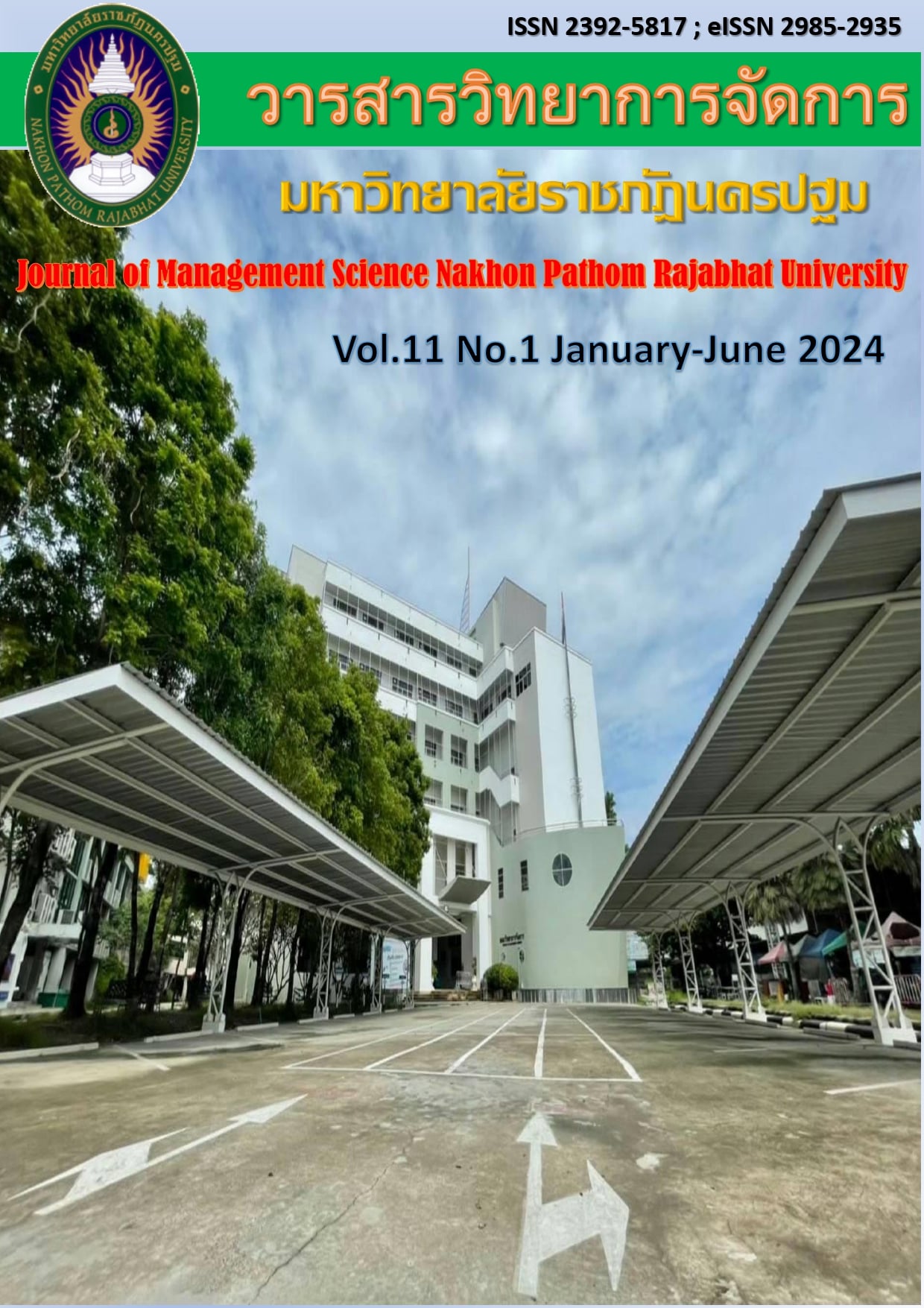ปัจจัยเชิงสาเหตุที่ส่งผลต่อการให้บริการ ความพึงพอใจ และผลการดำเนินงานองค์กรของกองทุนพัฒนากีฬาแห่งชาติ
Main Article Content
บทคัดย่อ
การวิจัยครั้งนี้มีวัตถุประสงค์ 1) ศึกษาอิทธิพลของปัจจัยเชิงสาเหตุที่ส่งผลต่อผลการดำเนินงานองค์กร 2) ศึกษาอิทธิพลของปัจจัยเชิงสาเหตุที่ส่งผลต่อผลความพึงพอใจ 3) ศึกษาอิทธิพลของปัจจัยเชิงสาเหตุที่ส่งผลต่อผลการให้บริการ การวิจัยนี้เป็นการวิจัยเชิงปริมาณ เก็บข้อมูลโดยใช้แบบสอบถาม จำนวน 400 คน สถิติที่ใช้ในสมมติฐาน คือ การวิเคราะห์สมการโครงสร้าง (Structural Equation Modeling: SEM) ผลการวิจัยตามสมมติฐาน พบว่า 1) การให้บริการมีอิทธิพลทางตรงเชิงบวกต่อความพึงพอใจ 2) การบริการมีอิทธิพลทางตรงเชิงบวกต่อผลการดำเนินงานองค์กร 3) ความพึงพอใจมีอิทธิพลทางตรงเชิงบวกต่อผลการดำเนินงานองค์กร 4) การสร้างพันธมิตรมีอิทธิพลทางตรงเชิงบวกต่อการให้บริการ 5) การจัดการการเปลี่ยนแปลงอิทธิพลทางตรงเชิงบวกกับการให้บริการ
การวิเคราะห์องค์ประกอบเชิงยืนยันพบว่า โมเดลตามสมมติฐานมีความสอดคล้องกับข้อมูลเชิงประจักษ์อยู่ในเกณฑ์ดี พิจารณาได้จากค่า = 96.07 มีนัยสำคัญทางสถิติที่ระดับ 0.14 (p-value = 0.14) ค่า CFI = 1.00 ประโยชน์จากการวิจัยนี้สามารถอธิบายความสัมพันธ์เชิงสาเหตุและผลลัพธ์ของการให้บริการที่ส่งผลต่อผลการดำเนินงานองค์กรของกองทุนพัฒนากีฬาแห่งชาติโดยสามารถนำผลการศึกษาไปใช้ในการบริหารจัดการเพื่อเป็นแนวทางในการบริหารจัดการให้มีผลการดำเนินงานขององค์กรที่ยั่งยืนต่อไป
*อาจารย์ประจำวิทยาลัยนวัตกรรมและการจัดการ มหาวิทยาลัยราชภัฏสวนสุนันทา
Article Details

อนุญาตภายใต้เงื่อนไข Creative Commons Attribution-NonCommercial-NoDerivatives 4.0 International License.
ทัศนะและข้อคิดเห็นของบทความที่ปรากฏในวารสารฉบับนี้เป็นของผู้เขียนแต่ละท่าน ไม่ถือว่าเป็นทัศนะและความรับผิดชอบของกองบรรณาธิการ
เอกสารอ้างอิง
สำนักงานสภาพัฒนาการเศรษฐกิจและสังคมแห่งชาติ. (2565). ยุทธศาสตร์ชาติ 20 ปี พ.ศ. 2561-2580.[ออนไลน์]. ค้นเมื่อ 12 มกราคม 2565, จาก http://nscr.nesdc.go.th/ns/.
Anastasiei, B., & Dospinescu, N. (2019). Electronic Word-Of-Mouth for Online Retailers: Predictors of Volume and Valence. Sustainability,11(3), 814-832. https://doi.org/10.3390/su11030814
Augustus Dee Roberts. (2018). Factors that Influence Successful Organizational Change in Corporations: Examination of Change Management, Employees’ Reaction to Change and Change Outcomes. In Dissertation. University of Maryland University College.
Cronbach, L. J. (1984) . A research worker's treasure chest. Multivariate behavioral research, 19(2-3), 223-240.
Deelen, I., Ettema, D., & Kamphuis, B. M. (2018). Sports participation in sport clubs, gyms or public spaces: how users of different sports settings differ their motivations, goals and sports frequency. Public Library of Science Journal, 13(10), 12-24.
Fernando, Y., Jabbour, C. J. C., & Wah, W. X. (2019). Pursuing green growtin technology firms through the connections between environmental innovation and sustainable business performance: Does service capability matter. Resources Conservation and Recycling, 141, 8-20
Hair, J. F., Black, W. C., Babin, B. J., Anderson, R. E., & Tatham, R. L. (2006). Multivariate data Analysis. (6th ed.). Uppersaddle River: Pearson Prentice Hall.
Hair, J., Black, W. C., Babin, B. J., & Anderson, R. E. (2010). Multivariate data analysis Upper saddle River, New Jersey Pearson Education International.
Harimukti, W., Harm-Jan, S., & Aard, G. (2018). Exploring stakeholders’ support in International equity placement strategic alliance. Gadjah Mada International Journal of Business, 20(2), 205-228.
Hult, G. T. M., Sharma, P. N., Morgeson III, F. V., & Zhang, Y. (2019). Antecedents and
Consequences of Customer Satisfaction: Do They Differ Across Online and Offline Purchases. Journal of Retailing, 95(1), 10-23.
Jeongeun, S., Tae-Eung, S., & Hyun-Woo, P. (2018). A network analysis of strategic alliance
drivers in ICT open ecosystem: with focus on mobile, cloud computing and multimedia. Multimedia Tools and Application, 77(12), 14725-14745.
Kang, M. & You, J. W. (2014). The role of academic emotions in the relationship between
perceived academic control and self-regulated learning in online learning. Computers & Education, 77, 125–133.
Likert, R. (1967). The Human Organization: Its Management and Value. McGraw-Hill.
Ling, H. C., & Chao, C. (2019). The Quality of Service at Community Health Centers in
Taiwan. International Journal of Organizational Innovation, 12(1). 340-352.
Mendoza, E. C. (2021). A Study of Online Customers Repurchase Intention Using the 4Rs of Marketing Framework. International Review of Management and Marketing,11(2), 1-10.
Mehta, C., & Gupta, P. (2014). Sculpting Future Leaders: An Intrapreneurial Approach. Global Journal of Finance and Management, 6(4), 313-320.
Nikolaou, I. E., Tsalis, T. A. & Evangelinos, K. I. (2019). A framework to measure corporate sustainability performance: A strong sustainability-based view of firm. Sustainable Production and Consumption, 18, 1-18.
Olvera, J et al. (2017). Transformational Leadership and horizontal trust as antecedents of team performance in the healthcarecontext. Anales De Psicologia, 33(2), 356-375.
Pallant, J. (2010). SPSS survival manual: A step by step guide to data analysis using SPSS. Maidenhead. Open University Press/McGraw-Hill.
Prompong, J. (2015). Factors Affecting Customer Satisfaction at Suvarnabhumi Airport, Bangkok. Faculty of Commerce and Accountancy Thammasat University.
Quan, N., Chi, N., Nhung, D., Ngan, N., & Phong, L. (2020). The Influence of Website Brand
Equity, E-Brand Experience on E-Loyalty: The Mediating Role of E-Satisfaction. Management Science Letters, 10(1), 63-76.
Rubin, A. (2012). Statistics for evidence-based practice and evaluation. US: Cengage Learning.
Salunke, S., Weerawardena, J., & McColl-Kennedy, J. R. (2019). The central role of knowledge integration capability in service innovation-based competitive strategy. Industrial Marketing Management, 76, 144-156.
Shankar, A., Jebarajakirthy, C., & Ashaduzzaman, M. (2020). How Do Electronic Word of Mouth
Practices Contribute to Mobile Banking Adoption. Journal of Retailing and Consumer Services, 52, 101920. doi.org/10.1016/j.jretconser.2019.101920
Theodorakopoulos, N., & Budhwar, P. (2015). Guest Editors' Introduction: Diversity and Inclusion in Different Work Settings: Emerging Patterns, Challenges, and Research Agenda. Human Resource Management, 54(2), 177-197. doi:10.1002/hrm.21715
Ziyae, B. (2016). Presenting an evaluation model of human resource management's effect on corporate entrepreneurship. World Journal of Entrepreneurship, Management and Sustainable Development, 12(3), 228-242.

